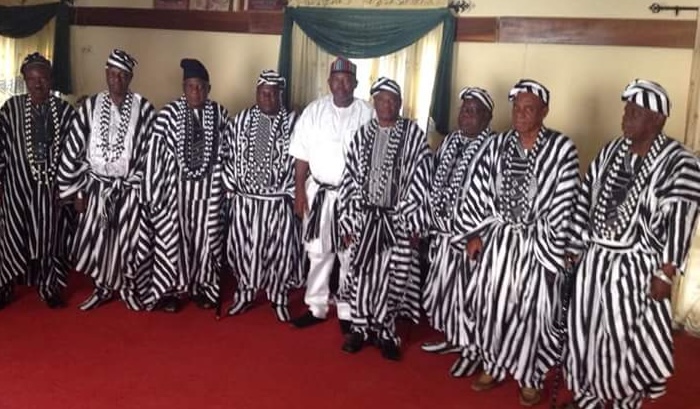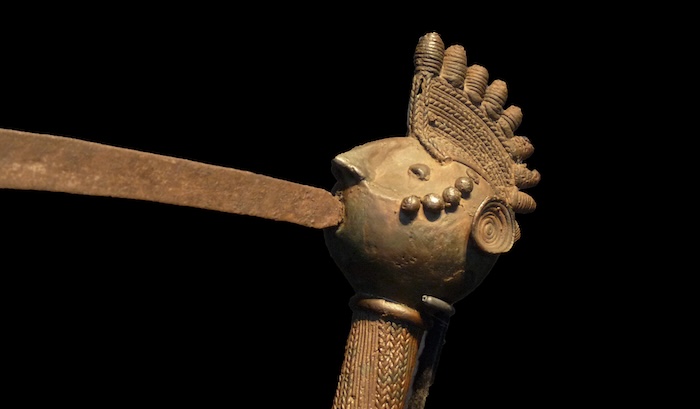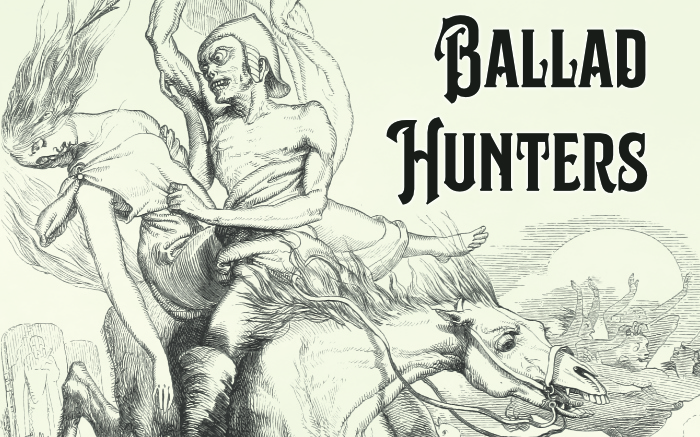In the first half of the 20th century, the Tiv people of east-central Nigeria developed a way to air their disputes called “drumming the scandal.” The quarrelers each wrote catchy songs about what a scumbag their rival was, then performed them so loud they could be heard from other villages. This technique tended to escalate disagreements until the dispute turned into a fistfight or until outside mediators stepped in to resolve the issue. Quarrelers publicizing their feud through thunderous song makes a great RPG adventure hook!
This post is brought to you by beloved Patreon backer Colin Wixted. Thanks, Colin—you rock!

Tiv society did not, historically, have much in the way of centralized authority. Decisions were arrived at by family consensus. In the case of issues affecting larger groups, leaders (elders, the rich, and the influential) from the affected family lineages had to come to a consensus. The closest thing to a court was a moot called a jir, but even the gathered community at a jir couldn’t impose a ruling the accused didn’t agree to—though peer pressure and ridicule could usually force someone to agree to just about anything, even suicide. In 1907, the newly-arrived British compelled the Tiv to agree to the appointment of lesser officials, called ortaregh (plural mbatarev), though mbatarev continued to resolve disputes through holding jirs.
“Drumming the scandal” makes more sense when you realize that neither party in the dispute had a singular authority—like a court or a chief—to whom they could appeal for justice when they felt they were wronged.
Drumming the scandal was not, in itself, justification for punishment by a jir—theoretically, of course. The whole point of a jir was that it’s more flexible than fixed laws. But theoretically a jir could only impose penalties if one of the songs sung by one of the quarrelers contained a lie. A lie here was defined as something that was both untrue and physically possible. A song about how a man sleeps with his neighbor’s wives was off-limits unless you could prove it. A song about how a man turns into a pig to sleep with everyone’s sows was, however, totally permissible and conveyed a similar idea.

In the spring of 1950, an argument developed between two Tiv men named Mtswen and Torgindi, who belonged to two different families from closely-related lineages. Mtswen was supposed to be looking after the health of the marriage of the woman who was married to Torgindi’s son. Mtswen behaved “highhandedly” and the marriage fell apart. Mtswen’s role as marriage guardian meant that he should then have mediated to help Torgindi get a refund from the family of Torginidi’s ex-daughter-in-law on the bride-price that Torgindi had paid the family to get his son married. Mtswen did not do that, and Torgindi did not get his money back.
So Torgindi wrote a song about what a jerk Mtswen was. At night, he drummed and sang the song as loud as possible. Supposedly, some Tiv at the time could sing so loud they could be heard three miles away, and Mtswen only lived a quarter-mile away. So Mtswen sure heard the song—and so did everybody else.
Mtswen wasn’t much of a songwriter, so he hired one to stay at his house and write songs about what a jerk Torgindi was, which Mtswen then loudly performed. Torgindi composed more songs, then hired a songwriter of his own when his creative output flagged. To generate excitement, both men brewed beer and cooked food for guests who would come over and dance and sing these songs with them. The songwriters stretched their imaginations to come up with accusations that wouldn’t be lies, nor would permanently destroy the relationship between the two men.
For three weeks, the quarrelers kept up this exhausting and expensive practice. The ortaregh grew concerned the men would turn to violence and maybe rope in their family members to help. So the ortaregh called a jir.

The two sides brought drums and dancers and revelers to the jir. To help the moot’s fact-finding mission, they performed all their songs. After deliberation, the jir’s consensus was that only one claim in one song was troublesome: that one of Torgindi’s wives steals yams. The moot decided that, even though Mtswen could offer no evidence that was true, they’d still allow it, because the woman was not Tiv by birth but Udam, and the jir suspected all Udams of being thieves.
The jir made two different findings. Mtswen, the high-handed marriage-overseer, was at fault and owed Torgindi restitution. Mtswen agreed to this finding because the alternative—continuing to drum the scandal—was probably even more expensive than restitution. However, even though Mtswen lost the case, he won the song contest. The jir ruled definitively that Mtswen had the catchier songs.
The jir then encouraged the hired songwriters to leave town for a few months until tempers cooled, and the dispute was over.

Image credit: Ji-Elle. Released under a CC BY-SA 3.0 license.
At your table, first off, drumming the scandal is a great complication. The PCs were in a cool place intending to do some unrelated thing—but the people who live here are in the middle of this big feud, and the weapons of the feud are free beer, snacks, dancing, and loud music. Whatever the party gets up to, some song will inevitably spread information that makes their lives harder, drunken revelers will spoil something, or one or both quarrelers will try to rope the party into the dispute.
Or you can go in a totally different direction. The PCs might be sent by some sort of authority to adjudicate—impartially, as outsiders—a fictional dispute based on drumming the scandal. They’ll have to determine right and wrong in the dispute that triggered the drumming, then whether any of the songs contained lies, and whether there are any mitigating circumstances. The PCs might be advised by a jir or something that looks like one. But, contrary to Tiv practices, the gaming session will be more fun if the final call rests with the players.
A key part of making this fun is giving it stakes. To do that, make one or more of the disputing NPCs recurring characters. Either have the feud involve someone (or multiple people) the PCs already have a relationship with, or have one or more of the NPCs be people the PCs have to expect they’ll see again.
As a GM, you’ll want to keep this dispute comprehensible, but interesting. One way to do that is with a series of ‘except’ statements:
– The triggering case is pretty straightforward about who’s right and wrong
– Except that the party in the right included a clear lie in one of their songs
– Except that the party in the wrong included a claim in one of their songs that’s literally impossible, but perfectly possible (and untrue) if taken as an idiom
– Except that the paid songwriter was an outsider who didn’t know the idiom
– Except the party guest who popularized the song knew the idiom and popularized the song anyway
– Except the party guest is the other side’s sister, so maybe it was a false flag
– Etc., etc., etc.
If your players enjoy cooperative authorship at the table, ask them to generate the ‘except’ statements. Ask one player to come up with a clear lie present in a song sung by the party in the right. Then ask the player sitting next to them for something that might invalidate or confound that objection. Ask the person sitting next to them for a confounding factor to that statement, and so forth until the exceptions to exceptions have become so minute and so trivial that the players can’t think of anything else.
Then it comes time for judgement. The party’s gathered advisors can offer their interpretations, but the final call belongs to the PCs. The biggest question is probably going to be where they draw the line on when the ‘except’ statements stop mattering. They might even draw the line at the very first lie, deciding that the initial dispute was important enough that bad behavior while drumming the scandal didn’t impact it. Whatever their decision, a recurring NPC will walk away unhappy with them, which is a sure way to generate further adventure!
——
Make sure you don’t miss a blog post by subscribing to my no-frills, every-other-week mailing list! I also have a signup that’s only for big product releases!
Looking for material for your game tonight? My back catalog has hundreds of great posts, all searchable and filterable so you can find something from real history or folklore that fits exactly what you need!
Come follow and chat with me on social media! On Bluesky, I’m @moltensulfur.bsky.social. On Mastodon I’m @MoltenSulfur@dice.camp.
Sing and fight magical folk ballads in 1813 England and Scotland! This free early-access edition has everything you need to play a Ballad Hunters one-shot about the traditional song Barbara Allen.
The game has:
– Investigative adventures centered around the lyrics of traditional British ballads
– Simple, story-driven rules inspired by the GUMSHOE engine
– A historical setting that is grim but hopeful
– Magic where characters make ballad verses come to life
Ballad Hunters is the sequel to Shanty Hunters, winner of a 2022 Ennie Award (Judge’s Choice) and nominee at the Indie Groundbreaker Awards for Most Innovative and Game of the Year.
You can download the free early-access version of the game from DriveThruRPG or Google Drive.
–
Sources:
Drumming the Scandal Among the Tiv by Paul Bohannan in Law and Warfare: Studies in the Anthropology of Conflict (1967)
Criminal Justice of the Tiv tribe of Nigeria by Neil R. McDonald (1972)







